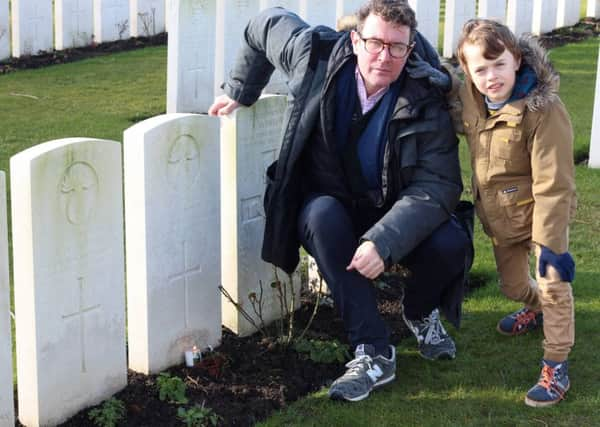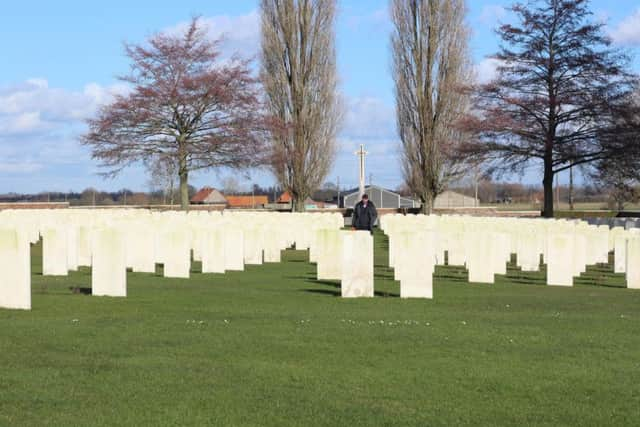Paying respect to private 101 years after war sacrifice


Up until very recently the story of the sacrifice of Private Furphy had been passed through his family in Co Armagh by word of mouth.
But in February, Lurgan man Gavin McAlinden took his seven-year-old son Shay to the Commonwealth War Cemetery in Voormezeele near the Belgian town of Ypres to pay their respects in person.
Advertisement
Hide AdAdvertisement
Hide AdJames Furphy was a 20-year-old private with the Royal Irish Fusiliers when he was killed on the first day of the Battle of Messines on Thursday, June 7, 1917.


Mr McAlinden said: “James Furphy was my grandmother Sarah’s older brother. He is listed in the 1911 Census as a 14-year-old bread server who could read and write. What circumstances brought James to the Battle of Messines and how exactly he died we’ll never know.
“Military war records show that the majority of Commonwealth casualties on that first day were sustained by German zeroed artillery fire.
“That first day was – by all accounts – pretty horrific. It began with a series of massive underground explosions that the Allies had mined in the weeks leading to the attack, with 10,000 Germans vaporised in moments.”
Advertisement
Hide AdAdvertisement
Hide AdHe said: “The ensuing generations of my family passed the memory of my great uncle and his sacrifice by word of mouth, but as I grew older it occurred to me that no one from my family had visited James’ grave and paid respects in person. So, as it approached the 100th anniversary of his death, I decided that I would visit his grave as a representative of my father’s and my own generation and take my seven-year-old son, Shay, as a representative of future generations.”


He described the visit to the cemetery: “Walking through that cemetery is a remarkable experience in which adult or child cannot fail to be moved. It’s almost as if the birds in the trees are silent and respectful, and you are made feel acutely present with the sheer eerie scale of that loss of human potential.
“The two most significant things that struck me where the average young ages of the fallen, but also the number of unknown graves, I imagine at that site possibly 30-40%.
“Trying to explain to a seven-year-old about war and why nations, traditions and religions get drawn into conflict can be a very intricate and complex process. I explained to my child that yes, it’s important to remember, and yes its crucial to respect, but I added a personal moral didactic: that wherever in our world conflict and suffering is happening, it is – without a doubt - wrong. Places like Voormezeele stand to remind us of that fact.”
Advertisement
Hide AdAdvertisement
Hide AdGavin McAlinden is a theatre director, writer, critic and academic. He is a full-time scholarship PhD candidate at the Institute of Irish Studies at The University of Liverpool.
However, on his visit to Ypres, he was simply one of millions of people trying to pay their respects to the war dead while trying to comprehend the scale of the sacrifice.
He said: “When I visited the area a taxi driver told me the town was almost completely destroyed by artillery fire during the war, and that Hitler himself had served as a corporal in Ypres during the war and was so enchanted by the town that he choose to revisit it after it was taken by the Germans in 1940.
“He told us how it took three years for residents to rebuild the town as an exact replica of how it had been. Modern day American tourists apparently fail to see the sense in this insistence on preservation with the narrow streets and one-way system.
Advertisement
Hide AdAdvertisement
Hide Ad“My new friend told me that for the people of Ypres, remembrance and respect were vital in their way of life. I tended to agree, and it occurred to me that it exactly the same reason that I was in Belgium that day.”